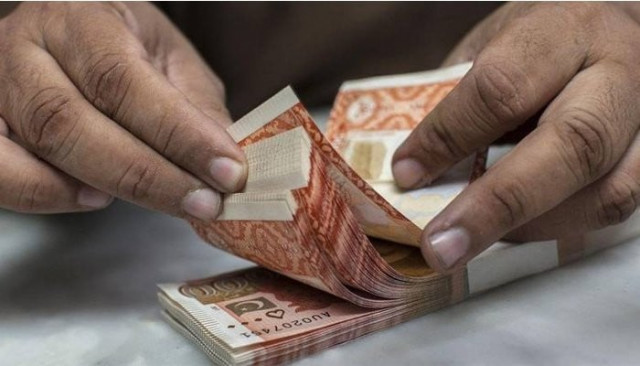No respite for falling rupee
Currency slips past Rs182 against dollar for first time in history

Pakistani rupee on Monday maintained its record-breaking downward streak, as it depreciated beyond Rs182 against the US dollar for the first time in history owing to strengthening of the greenback globally and elevated international oil prices.
The rupee freshly depreciated 0.23% and hit a new all-time low at Rs182.19 against the US dollar in the inter-bank market, according to Pakistan’s central bank data. The rupee has maintained its record-breaking downward movement for the 10th consecutive working day, except Thursday (March 24) when it closed flat on a day-on-day basis. The currency has cumulatively lost 2% (or Rs3.68) in the past 10 days from Rs178.51 on March 11.
Since the beginning of current fiscal year, the rupee has dropped a massive 15.6% (or Rs24.65) as compared to the previous fiscal year’s close at Rs157.54 on June 30, 2021. Pakistani rupee has maintained its slump mainly because “the US dollar is gaining strength against other major global currencies for the past few days”, Ismail Iqbal Securities Head of Research Fahad Rauf said while talking to The Express Tribune.
“So, the rupee is facing double pressure,” he said, adding that “it is losing ground due to the challenges in the domestic economy coupled with the appreciation of the US dollar”. “The delay in IMF (International Monetary Fund) loan programme is also keeping the rupee volatile,” he underlined. The IMF is conducting a seventh review of the economy under its $6 billion loan programme. It was due to announce results of the review last Tuesday (March 22) as per Finance Minister Shaukat Tarin’s statement.
READ Rupee likely to be ‘weakened amid rising trade balance'
However, the lending institution - which earlier expressed surprise over Prime Minister Imran Khan’s decision to subsidise petroleum products and power tariff - held its decision to officially delay or resume the programme “waiting for clarity in domestic politics”, he said. The IMF will release the next loan tranche, if it is satisfied with Pakistan’s economy under the seventh review. “Delay in release of the next tranche, as it waits for the government to implement its promises under the loan programme, will continue to mount pressure on the rupee,” Rauf maintained.
Topline Securities Director Research Syed Atif Zafar underlined that the elevated crude oil prices had kept mounting pressure on the rupee. “The higher international crude oil prices will keep Pakistan’s import bill on a higher side and widen the current account deficit,” he said. However, the WTI (West Texas Intermediate) crude price has returned to $105 a barrel from $115 last week, after China considered imposing a lockdown in Shanghai to control Covid-19.
“The oil price above $100 a barrel will still be called elevated as compared to $70 per barrel a year ago,” he said. The current account deficit surprisingly nosedived to around $550 million in February 2022 from an all-time high of $2.53 billion in the previous month. “The deficit is, however, estimated to remain around $1 billion in March in the wake of higher energy prices,” Zafar projected. “The rupee may depreciate to Rs185-190 by the end of this fiscal year (2021-22),” he added. Higher international crude oil prices would keep the rupee under pressure as Pakistan heavily relies on imported energy.
Regarding the central bank’s intervention, experts were divided on whether the State Bank of Pakistan (SBP) would come to rescue the rupee or let it fall. The central bank has powers to intervene (inject dollars) in the interbank market, if it finds the rupee is depreciating beyond its fair value. Capital flight, reserves Rauf further noted that the rupee was also under pressure as foreign investors were continuously withdrawing investments from local stocks and bond markets. “The outflows are taking a toll on Pakistan’s foreign exchange reserves,” he said.
The pullout of foreign investment is seen in addition to foreign debt repayment by the government. Accordingly, SBP’s foreign exchange reserves have declined to a one-year low of $15 billion. Foreign investors have pulled out a net $394 million from stock and bond markets in the current month (till March 25). Alone in the bond market, foreigners sold T-bills and Pakistan Investment Bonds (PIBs) worth $352 million in the current month. “It is the highest monthly sale after April 2020 ($601 million),” Arif Habib Limited Head of Research Tahir Abbas mentioned.



















COMMENTS
Comments are moderated and generally will be posted if they are on-topic and not abusive.
For more information, please see our Comments FAQ